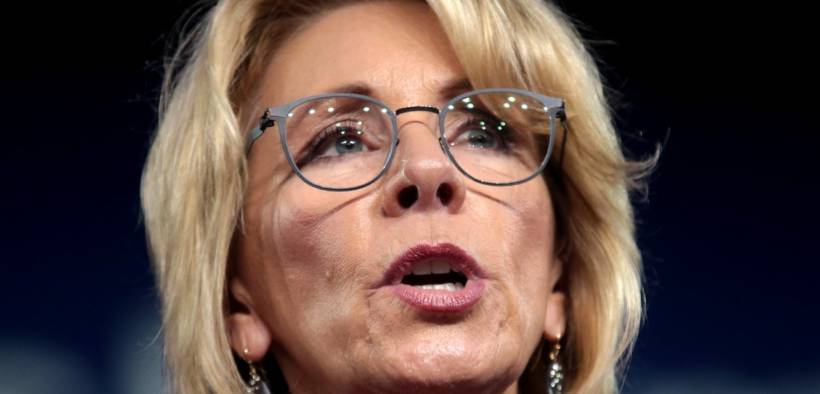Education Department Unveils Sweeping Changes to Campus Sexual Assault Rules

“With school resources already stretched thin, now is not the time to require school administrators, faculty, and staff to review new, complex title IX regulations, revise their schools’ policies in response, and communicate these changes to students and parents.”
The US Department of Education issued new regulations for US schools, public and private, to follow when handling sexual assault cases. The new rules include a formal process for schools when implementing Title IX, which bars sexual discrimination, The New York Times reported.
Legal precedent as early as 1980 established that sexual violence could be classified as sexual discrimination. The idea was further cemented in 2011 when the Education Department penned the “Dear Colleague” letter writing, “The sexual harassment of students, including sexual violence, interferes with students’ right to receive an education free from discrimination and, in the case of sexual violence, is a crime.”
However, it had been up to individual schools to determine the best course of action when facing legal challenges pertaining to Title IX, such as when one student accuses another of rape. In some cases, schools have been named as defendants in addition to the perpetrator.
Education Department Lays Down the Rules
An immediate change introduced with the department’s new regulations is a revised definition of sexual harassment. Under the Obama administration, it had been broadly defined as any action that “interferes with or limits” a student’s opportunity to use school facilities, The Associated Press reported. This legal definition was established by the Supreme Court. However, the department’s guidelines do allow schools to consider sexual harassment that “a reasonable person” would consider it as.
The new rule classifies sexual harassment as actions “so severe, pervasive, and objectively offense,” that render victims incapable of accessing a school’s education programs. Schools will also be given the choice between two different standards of evidence when evaluating assault cases, according to the Guardian.
The changes will also limit schools to responding only to incidents that transpired during school programs or events and institutions will have the discretion with whether to require “preponderance of evidence” or “clear and convincing evidence” before proceeding. The former generally requires a victim to provide less proof to establish a crime took place, whereas the latter imposes a stricter bar for the plaintiff to clear.
Universities will be required to investigate incidents that take place “at a building owned or controlled by a student organization, that is officially recognized by a postsecondary institution,” meaning fraternity and sorority houses would be fair game for investigations, The New York Times reported.
In order for a school to be held liable for sexual misconduct under the new policy, a court would have to find that they acted with “deliberate indifference” in handling the case.
Furthermore, the department will require schools hold live hearings during which both victims and the accused will have an opportunity to cross-examine one another. Both sides will be allowed representation, either an advisor or lawyer, who will perform the cross-examination, The Associated Press reported. The accuser and accused will not be required to directly engage one another at the hearings.
Victims rights groups argued this change “tips the scales in favor” of abusers, reported the Guardian.
DeVos Heralds Changes as Fair for Both Sides
Secretary of Education Betsy DeVos announced the updated regulations on Wednesday and declared them a positive development for victims.
“Today we release a final rule that recognizes we can continue to combat sexual misconduct without abandoning our core values of fairness, presumption of innocence and due process,” DeVos said. “This empowers survivors with more tools than ever before.”
DeVos first declared her intention to overhaul the department’s guidelines in September 2017. At that time, she expressed concerns that students accused of sexual harassment are frequently denied due process.
“Too many students have lost access to their education because their school inadequately responded when a student filed a complaint of sexual harassment or sexual assault,” DeVos said in a statement announcing the new policy. “This new regulation requires schools to act in meaningful ways to support survivors of sexual misconduct, without sacrificing important safeguards to ensure a fair and transparent process. We can and must continue to fight sexual misconduct in our nation’s schools, and this rule makes certain that fight continues.”
Challenges Quickly Surface
Know your IX was among the victim rights groups to condemn the changes: “The rule does not prioritize students and survivors, but rather tips the scales in favor of named abusers and protects universities and their bottom lines,” said the group in a statement. “If this rule goes into effect, schools will be shielded from liability for ignoring or covering up sexual harassment.”
The National Women’s Law Center intends to fight the rules in court.
“If this rule goes into effect, survivors will be denied their civil rights and will get the message loud and clear that there is no point in reporting assault,” said Fatima Goss Graves, president and CEO of the center. “We refuse to go back to the days when rape and harassment in schools were ignored and swept under the rug.”
Democratic legislators also questioned the timing of the department’s rule change, CNN reported.
“Our education system is facing an unprecedented crisis. But instead of focusing on helping students, educators, and schools cope with (Covid-19), Secretary DeVos is eroding protections for students’ safety,” Democrats on the House Committee on Education tweeted.
“With school resources already stretched thin, now is not the time to require school administrators, faculty, and staff to review new, complex title IX regulations, revise their schools’ policies in response, and communicate these changes to students and parents,” wrote the attorneys general of 17 states who wanted to delay changes until after the pandemic, who represent states including Michigan, New York and North Carolina.
DeVos, however, responded that “civil rights really can’t wait” as sexual misconduct cases continue to move forward.













